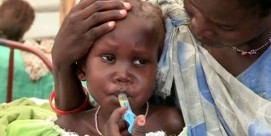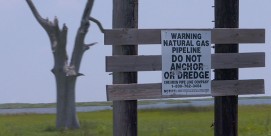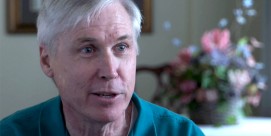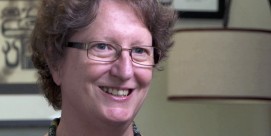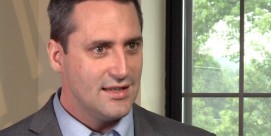In This Episode << SLIDE LEFT TO SEE ADDITIONAL SEGMENTS
Hurricane Katrina Faith-Based Relief Efforts
BOB ABERNETHY, anchor: As the Gulf Coast reels from the devastation of Hurricane Katrina and the federal government tries to speed up its much-criticized response to the crisis, especially in New Orleans, religious groups are playing a key role in emergency relief efforts. We have two reports. First, Kim Lawton in Washington.
President GEORGE BUSH: This recovery is going to be a long process. It’s going to take a lot of hard work and patience and resolve.
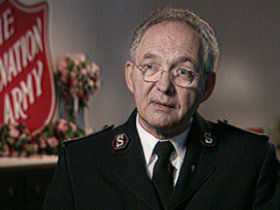
KIM LAWTON: As the magnitude of the disaster began to emerge, faith-based groups across the spectrum sprang into action. The Salvation Army partnered with the Red Cross and federal emergency officials to coordinate initial efforts on the ground.
Commissioner TODD BASSETT (National Commander, Salvation Army U.S.): We try to be the first in and the last out.
LAWTON: Commissioner Todd Bassett headed to the Gulf Coast to assess the damage and encourage Salvation Army workers already there. Meanwhile, the Army has suffered its own damage.
Commissioner BASSETT: Right this minute, we are not sure of some of our centers, but we do know that we have lost two of our program facilities completely, one in Biloxi, and that we have lost three of our officers’ quarters, and there has been damage to several other of our facilities.
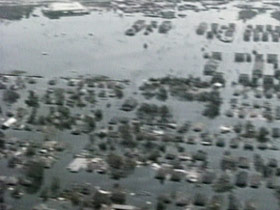
LAWTON: Hundreds of faith-based volunteers rushed into the devastated areas to help with rescue operations, while others mobilized to provide desperately needed food, medicine, and shelter. Southern Baptists initially committed to provide 300,000 meals a day for the next 90 days, but a spokesman expected that number to rise to more than one million. Congregations from almost every denomination opened their facilities and became emergency shelters.
National Protestant, Orthodox, Catholic, Jewish, and Muslim groups all set up emergency relief funds and issued special appeals to aid the victims. Many religious leaders also urged prayers for the victims.
Archbishop THEODORE MCCARRICK (during service): What our brothers and sisters in Louisiana and Alabama and Mississippi are suffering today is our suffering, too.
LAWTON: Local congregations far from the scene are organizing aid. The Archdiocese of Washington, D.C., for example, has asked its pastors and school principals to take in Catholic students evacuated from the hurricane areas.
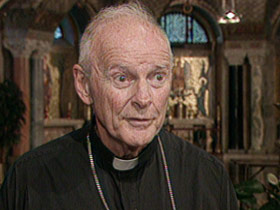
Archbishop MCCARRICK: We’re children of God, and God calls us to have this sense of family, that when someone in your family is sick or doesn’t have any water or has too much water or doesn’t have clothing, you have to reach out to help, and that’s really what moves and motivates our people.
LAWTON: Despite all the efforts, relief officials acknowledge the situation is becoming more desperate.
Commissioner BASSETT: This disaster that we’re facing right now has to be the most incredible disaster that has ever been faced in the United States. For us in the Salvation Army, we have never seen devastation this great, and the demand that is being placed on us in turn is one that is taxing us absolutely to our limit.
LAWTON: They’re scrambling to meet the immediate needs before they can even begin to look at the monumental task of long-term recovery.
I’m Kim Lawton reporting. Now, Fred de Sam Lazaro in Biloxi, Mississippi.
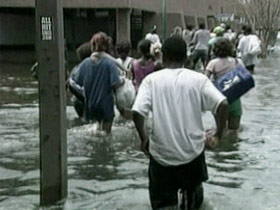
FRED DE SAM LAZARO: It’s hard to find people anywhere in what was Biloxi’s main strip. Today, the carcasses of giant casinos that floated in the Gulf lie tilted on dry ground, lifted clear across the street.
People instead spend their waking hours in very, very long lines — for gasoline, for water and ice, and, for those at the First Baptist Church, a hot meal.
The Southern Baptist Convention, the nation’s third largest relief agency, was among the earliest to reach here, tapping its core of volunteers from across the Southeast.
UNIDENTIFIED SOUTHERN BAPTIST CONVENTION VOLUNTEER (Praying): We pray, Father, that somehow through a warm meal, a listening ear, a thoughtful word we would give them the courage to go another day.
DE SAM LAZARO: Each day here begins with a 6 a.m. devotional prayer. It ends 12 to 14 hours and 3,000 meals later.
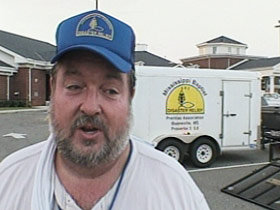
VERNON BOTELOR (Mississippi Baptist Conference): You know, this is a way we can minister to the people, by giving them a hot meal. I wish we could give them a cold drink of water, but we can’t get it. Now I understand that our president has said that we are going to send 400 trucks into this area. That’d be great, but we haven’t seen it. All we’ve seen is people in need.
DE SAM LAZARO: Few local churches, many themselves victims of Katrina, could meet much of the overwhelming need. Still, there are small miracles. At the Main Street Missionary Baptist Church, people came in to give food as well as get it.
Deacon ALPHONSE GRAVES (Main Street Missionary Baptist Church): Whatever they’ve got in their house, the canned goods — they’re bringing everything. And when they bring it to us we open it up, and we cook it for the rest of the people that’s walking in. Whoever comes in is welcome to whatever we’ve got.
DE SAM LAZARO: The church’s sanctuary was demolished by the storm. But on the day Katrina hit, as the water rose, the upstairs community room became a different kind of sanctuary.
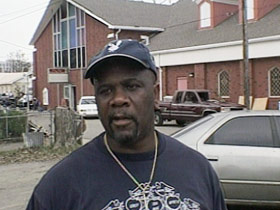
Deacon GRAVES: We had a whole lot of elderly people in the church that we had to bring from the bottom stairs up to the top floor. So, you know, me and the rest of the pastors here, we hung in here throughout the water, watched it rise, and prayed with them and kept a lot of them calm. And we just become as a family in one unit.
DE SAM LAZARO: With so many of the churches wiped out, Biloxi’s high school has become the main shelter in town, if not the only shelter. There’s a limited amount of food. There is water for everyone. But there is no electricity and all that that brings. And, most critical for a lot of people here, there’s no information.
UNIDENTIFIED WOMAN #1: I’m looking for my daughter and grandchildren.
DE SAM LAZARO: With phone service almost nonexistent, many survivors sought desperately to reach family members.
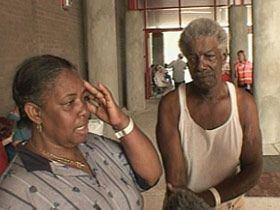
UNIDENTIFIED MAN #1: They don’t know, so …
UNIDENTIFIED WOMAN #2: So I could see that my family and my girls — I have one in Virginia — and the rest of my family is in California, my mom and everybody.
DE SAM LAZARO: Joseph Brooks was among the lucky ones. In the school parking lot, he managed to borrow a cell phone and, small miracle, get through to a sister in Missouri.
JOSEPH BROOKS: She told me I ought to get down on my hands and knees wherever I’m at or was at and thank God that I’m still sitting here, talking and alive.
DE SAM LAZARO: It’s a sentiment heard over and over again as survivors recount their narrow escapes — rescues from rooftops and attics.
UNIDENTIFIED MAN #2: I’d be insane without the Holy Ghost. It’s the joy of God that keeps me going.
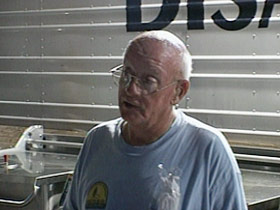
UNIDENTIFIED WOMAN #3: That’s what’s gotten us through. You know, I mean, we literally, we’re hanging off that gutter for two and a half hours; we were all five of us praying, you know, saying, you know, “Please God, just give us our lives.”
Deacon JAMES PRICE (Main Street Missionary Baptist Church): I believe it brought a whole lot of people closer to God. Some of them, you don’t see them at the church until a tragedy happens.
DE SAM LAZARO: The scope of this tragedy will take some time to sink in and a lot more time to repair.
UNIDENTIFIED SOUTHERN BAPTIST CONVENTION VOLUNTEER: Remember, we’re doing this for God. And a lot of people are pretty angry, perhaps, with God today. But they’re going to have a different view of God, because God cares.
DE SAM LAZARO: The Southern Baptist Convention says it will remain here for as long as needed. Many more agencies will follow as relief work, at least in the months and years ahead, will replace casinos as the economic mainstay here.
For RELIGION & ETHICS NEWSWEEKLY, this is Fred de Sam Lazaro in Biloxi, Mississippi.


